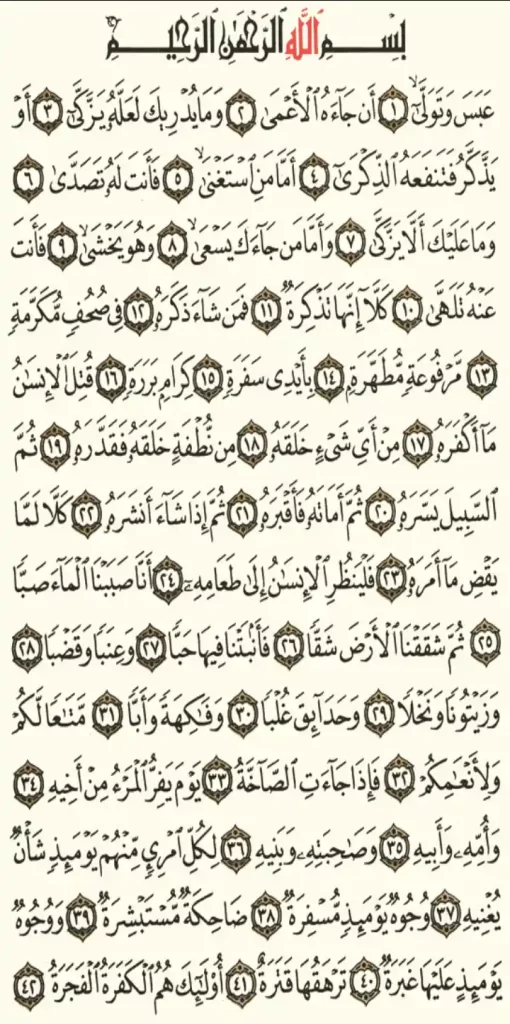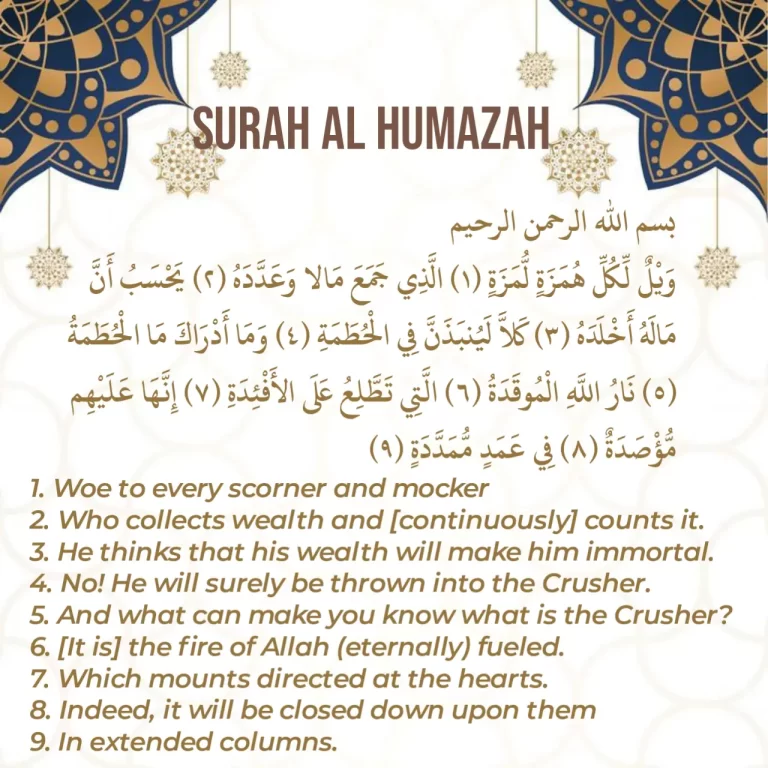Surah Abasa Transliteration, Arabic, And Translation In English
Surah Abasa which means He Frowned in English, is the 80th chapter of the Qur’an, with 42 verses. It is a Meccan surah. The chapter is so designated after the word abasa with which it opens.
Advertisements
About Surah Abasa Watawala
| Place of revelation | Makkah |
| Name Meaning | He Frowned |
| Number of verses | 42 verses |
| Surah before | Surah Naziat |
| Surah after | Surah Takwir |
| Position | 30 juz |
Surah Abada in Arabic
- بِسْمِ اللَّهِ الرَّحْمَٰنِ الرَّحِيمِ
- 1. عَبَسَ وَتَوَلَّىٰ
- 2. أَنْ جَاءَهُ الْأَعْمَىٰ
- 3. وَمَا يُدْرِيكَ لَعَلَّهُ يَزَّكَّىٰ
- 4. أَوْ يَذَّكَّرُ فَتَنْفَعَهُ الذِّكْرَىٰ
- 5. أَمَّا مَنِ اسْتَغْنَىٰ
- 6. فَأَنْتَ لَهُ تَصَدَّىٰ
- 7. وَمَا عَلَيْكَ أَلَّا يَزَّكَّىٰ
- 8. وَأَمَّا مَنْ جَاءَكَ يَسْعَىٰ
- 9. وَهُوَ يَخْشَىٰ
- 10. فَأَنْتَ عَنْهُ تَلَهَّىٰ
- 11. كَلَّا إِنَّهَا تَذْكِرَةٌ
- 12. فَمَنْ شَاءَ ذَكَرَهُ
- 13. فِي صُحُفٍ مُكَرَّمَةٍ
- 14. مَرْفُوعَةٍ مُطَهَّرَةٍ
- 15. بِأَيْدِي سَفَرَةٍ
- 16. كِرَامٍ بَرَرَةٍ
- 17. قُتِلَ الْإِنْسَانُ مَا أَكْفَرَهُ
- 18. مِنْ أَيِّ شَيْءٍ خَلَقَهُ
- 19. مِنْ نُطْفَةٍ خَلَقَهُ فَقَدَّرَهُ
- 20. ثُمَّ السَّبِيلَ يَسَّرَهُ
- 21. ثُمَّ أَمَاتَهُ فَأَقْبَرَهُ
- 22. ثُمَّ إِذَا شَاءَ أَنْشَرَهُ
- 23. كَلَّا لَمَّا يَقْضِ مَا أَمَرَهُ
- 24. فَلْيَنْظُرِ الْإِنْسَانُ إِلَىٰ طَعَامِهِ
- 25. أَنَّا صَبَبْنَا الْمَاءَ صَبًّا
- 26. ثُمَّ شَقَقْنَا الْأَرْضَ شَقًّا
- 27. فَأَنْبَتْنَا فِيهَا حَبًّا
- 28. وَعِنَبًا وَقَضْبًا
- 29. وَزَيْتُونًا وَنَخْلًا
- 30. وَحَدَائِقَ غُلْبًا
- 31. وَفَاكِهَةً وَأَبًّا
- 32. مَتَاعًا لَكُمْ وَلِأَنْعَامِكُمْ
- 33. فَإِذَا جَاءَتِ الصَّاخَّةُ
- 34. يَوْمَ يَفِرُّ الْمَرْءُ مِنْ أَخِيهِ
- 35. وَأُمِّهِ وَأَبِيهِ
- 36. وَصَاحِبَتِهِ وَبَنِيهِ
- 37. لِكُلِّ امْرِئٍ مِنْهُمْ يَوْمَئِذٍ شَأْنٌ يُغْنِيهِ
- 38. وُجُوهٌ يَوْمَئِذٍ مُسْفِرَةٌ
- 39. ضَاحِكَةٌ مُسْتَبْشِرَةٌ
- 40. وَوُجُوهٌ يَوْمَئِذٍ عَلَيْهَا غَبَرَةٌ
- 41. تَرْهَقُهَا قَتَرَةٌ
- 42. أُولَٰئِكَ هُمُ الْكَفَرَةُ الْفَجَرَةُ
Surah Abasa Transliteration
- 1. ‘Abasa wa tawallaa.
- 2. An jaa-ahul ‘a-maa
- 3. Wa maa yudreeka la’allahu yaz zakkaa.
- 4. Aw yazzakkaru fatanfa ‘ahuz zikraa.
- 5. Amma manis taghnaa
- 6. Fa-anta lahu tasaddaa
- 7. Wa ma ‘alaika allaa yaz zakka.
- 8. Wa amma man jaa-aka yas’a
- 9. Wahuwa yakhshaa,
- 10. Fa-anta ‘anhu talah haa.
- 11. Kalla innaha tazkirah
- 12. Faman shaa a zakarah
- 13. Fi suhufim mukar rama,
- 14. Marfoo’atim mutah hara,
- 15. Bi’aidee safara
- 16. Kiraamim bararah.
- 17. Qutilal-insanu maa akfarah.
- 18. Min aiyyi shai-in Khalaq
- 19. Min nutfatin khalaqahoo faqaddarah.
- 20. Thummas sabeela yas-sarah
- 21. Thumma amatahu fa-aqbarah
- 22. Thumma iza shaa-a ansharah
- 23. Kalla lamma yaqdi maa amarah.
- 24. Falyanzuril insanu ilaa ta-amih
- 25. Anna sabab nalmaa-a sabba.
- 26. Thumma sha qaqnal-arda shaqqa.
- 27. Fa ambatna feeha habba
- 28. Wa ‘inabaw-wa qadba
- 29. Wa zaitoonaw wanakh la’
- 30. Wa hadaa-iqa ghulba
- 31. Wa faki hataw-wa abba.
- 32. Mata’al-lakum wa li-an’amikum.
- 33. Faiza jaa-atis saakhah.
- 34. Yauma yafir-rul mar-u min akheeh
- 35. Wa ummihee wa abeeh
- 36. Wa sahi batihee wa baneeh.
- 37. Likul limri-im-minhum yawmaa-izin shaa nuy-yughneeh
- 38. Wujoo huny-yauma-izim-musfira;
- 39. Dahi katum mustab shirah
- 40. Wa wujoohuy yauma-izin ‘alaiha ghabar a
- 41. Tarhaquha qatarah.
- 42. Ulaa-ika humul-kafa ratul-fajarah.
Surah Abasa Translation In English
- 1. He frowned and turned away,
- 2. when the blind man came to him.
- 3. How do you know? Perhaps he may be purified.
- 4. or he may pay heed and benefit from the reminder.
- 5. But as for him who is indifferent,
- 6. you give him your full attention,
- 7. although you are not to be blamed if he does not want to be purified.
- 8. Yet as for the one who has come to you eagerly [seeking purification],
- 9. for he fears Allah,
- 10. you allow yourself to be distracted from him.
- 11. Nay; verily this is an admonition –
- 12. so let him who will, pay heed to it
- 13. on pages venerable,
- 14. exalted and pure,
- 15. [borne] in the hands of [angelic] emissaries,
- 16. honourable and obedient.
- 17. May man perish; how ungrateful he is!
- 18. From what did Allah create him?
- 19. From a drop of semen He has created him and then fashioned him in due proportion.
- 20. Then He makes his path easy for him;
- 21. then He causes him to die and be buried;
- 22. then, when He wills, He will resurrect him.
- 23. Nay, he has not done what Allah commanded him.
- 24. Let man consider the food he eats:
- 25. We send down rain in abundance,
- 26. and cause the soil to break open [as seeds sprout and plants begin to grow],
- 27. and cause grains to grow therein,
- 28. and grapevines, and [fresh] fodder,
- 29. and olive trees and date palms,
- 30. and gardens dense with lofty trees,
- 31. and fruits and grass,
- 32. as provision for you and your livestock.
- 33. So when the deafening blast [on the Trumpet] comes,
- 34. on that day a man will flee from his own brother,
- 35. and from his mother and his father,
- 36. and from his wife and his children.
- 37. Every one of them, on that day, will have too many concerns of his own to care about anyone else.
- 38. On that day, some faces will be beaming,
- 39. laughing and rejoicing.
- 40. And on that day, some faces will be covered with dust,
- 41. overcast with gloom.
- 42. Such will be the disbelievers, the wicked.

Why was Surah Abasa Revealed?
The reason for the revelation of surah Abasa was that a blind man who was a believer came to ask questions of the Prophet and leam from him.
But a rich man had come to him, and the Prophet was keen to guide people, so he focused his attention on the rich man and turned away from the poor blind man, hoping that the rich man would be guided and be purified.
Allah rebuked him gently in these verses, as He said: (He frowned and turned away) physically, when the blind man came to him.
Then Allah mentions the benefit of turning to the blind man and speaking to him:
Advertisements
How do you know? Perhaps he? namely the blind man (may be purified) that is, perhaps he may be purified from bad characteristics and attain good characteristics (or he may pay heed and benefit from the reminder that is, perhaps he may pay heed to that which would benefit him, and act upon that reminder.
This is a great benefit; it is the purpose for which the Messengers were sent and for which preachers exhort and remind, so if you had turned to and focused your attention on the one who came by himself, seeking that from you, that would have been more appropriate.
As for your turning and focusing your attention on the rich man who does not care and does not want to ask or find out anything because of his lack of desire for good, and your ignoring the one who is more important than him, that was not appropriate, because you are not to be blamed if he does not want to be purified, for you are not to be held accountable for what he does of evil.
This lends support to the well-known principle that says: do not abandon that which will lead to a definite interest for something that is merely speculative, and do not give up that which definitely could serve a purpose for that which may or may not serve a purpose.
You should focus your attention on the seeker of knowledge who needs it and is keen to acquire it, more than focusing on others.
Advertisements
Then Allah says: Nay; verily this is an admonition that is, indeed this exhortation is an admonition from Allah, by means of which He reminds His slaves and explains to them in His Book what they need to know, highlighting the difference between the path of guidance and the path of misguidance.
Once that is clear, then let him who will, pay heed to it that is, act upon it.
Then Allah mentions the location of this admonition, and its greatness and immense virtue:
Advertisements
On pages venerable, exalted in status and purely free of any defects and preserved so that the hands of the devils cannot reach it and they cannot eavesdrop on its contents.
Rather it is [borne] in the hands of [angelic] emissaries, for the angels are the emissaries between Allah and His slaves.
Honourable that is, extremely good and blessed and obedient in their hearts and deeds.
All of that is part of Allah’s preservation of His Book; the emissaries who bring it to the Messengers are the noble angels, who are strong and righteous, and He has not allowed the devils any way of reaching it.
This is something that requires us to believe in it and accept it.
Yet despite that, man insists on disbelieving. Hence Allah says:
May man perish; how ungrateful he is for the blessings of Allah, and how strong is his stubbornness towards the truth after it has become clear, when he is no more than he is.
For he is one of the weakest of things; Allah created him from an insignificant fluid, then He fashioned him in due proportion, then He made him into a perfect human being, and gave him physical strength both apparent and hidden.
Then He makes his path easy for him that is.
He guides him to what he needs of religious and worldly means, guides him to the right path, makes it clear for him, and tests him with commands and prohibitions.
Then He causes him to die and be buried. He has honoured man with burial and has not made him like all other animals, whose bodies are left on the face of the earth.
Then, when He wills, He will resurrect him that is, He will resurrect him after death, for the requital.
Allah is the only One Who controls man and manages his affairs; no one has any share in that.
Yet despite that man does not do what Allah enjoins upon him, and he does not fulfil what Allah has made obligatory upon him; rather he continually falls short of what is required of him.
Then Allah commands man to look at his food and reflect upon it and how it reaches him after many stages, for He has made it available for him.
Let man consider the food he eats: We send down rain in abundance that is, we send down rain upon the earth in copious amounts.
And cause the soil to break open [as seeds sprout and plants begin to grow], and cause grains to grow therein this includes all types of grains.
And grapevines, and [fresh] fodder which is food for livestock and olive trees and date palms.
These four things are singled out for mention because of their many benefits.
And gardens dense with lofty trees that is, gardens in which the branches of the trees are intertwined.
And fruits and grass the word translated here as (fruits) refers to that in which people delight, such as dates, grapes, plums, pomegranates, and so on.
The word translated here as (grass) refers to that which is eaten by animals and livestock.
Hence Allah says: as provision for you and your livestock which Allah has created and put at your service.
So whoever looks at these blessings must give thanks to his Lord and strive hard to turn to Him, obey Him and believe in what He tells him.
That is, when the Trumpet blast of the resurrection comes, which will deafen all creatures because of its immense volume, and hearts are filled with panic on that day because of what people will see of horrors, and they will realise how desperately they will need their previous righteous deeds,
On that day a man will flee from the dearest of people to him, from his own brother, and from his mother and his father, and from his wife and his children.
That is because Every one of them, on that day, will have too many concerns of his own to care about anyone else that is, he will be focusing on himself and his main concern will be to save himself; he will not pay attention to anyone else.
At that point, humankind will be divided into two categories: the blessed and the doomed.
As for the blessed, on that day their faces will be beaming, that is, happiness and joy will be apparent on their faces, because they will know that they are saved and have attained bliss, so they will be laughing and rejoicing.
And the faces of the doomed will be covered with dust, overcast with gloom, which is like a shadow of intense darkness.
They will have despaired of all good and will know that they are lost and doomed.
Such namely those who meet this description will be the disbelievers, the wicked that is, those who were ungrateful for the blessings of Allah, disbelieved in His signs, and transgressed His limits.
We ask Allah to keep us safe and sound, for He is Most Generous, Most Kind.
This is the end of the commentary on Surah Abasa by Imam As Sa’adi.
All praise and thanks are for Allah, and may the blessings and peace of Allah be upon Prophet Muhammad, his family, and his Companions abundantly until the Day of Judgement.
Advertisements







